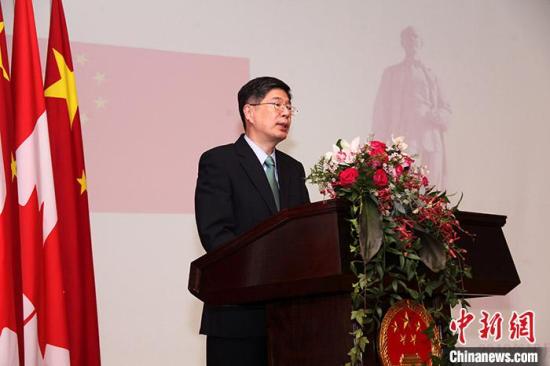Canada, China need to 'find a way forward'


In celebrating the 93rd anniversary of the founding of the Chinese People's Liberation Army on Saturday, Chinese Ambassador to Canada Cong Peiwu delivered a message of friendship commemorating the 50 years of diplomatic ties between Beijing and Ottawa.
According to Ottawa Life, the friendly message may signal that "despite the current ongoing diplomatic tensions between the two countries, efforts are still underway behind the scenes to find a way forward".
This year marks the 50th anniversary of the establishment of diplomatic relations between the two countries, although the occasion has been marred by the current discord between the US and China, which has led to a rise in diplomatic tensions between Canada and China.
Jack Austin, a former member of the Canadian Senate, insisted that his country must find an effective way to open new aspects of its relationship with China.
At a Canada-China Economic Forum hosted by the Jack Austin Centre for Asia Pacific Business Studies at Simon Fraser University, Austin said it's no secret that broader Canada-China relations have been hurt over the handling of the case of Meng Wanzhou.
Meng, the chief financial officer of Huawei Technologies Co Ltd, was arrested by the Royal Canadian Mounted Police under a US extradition request on Dec 1, 2018.
"The tension has eroded the positive growth of our bilateral relationship. As a neighbour to the United States, which is Canada's No. 1 trading partner, Canada is caught in the crossfire between the US and China," Austin told the forum.
"Nonetheless it is in the long-term interests of Canada and China to persevere on the 50th anniversary of the establishment of diplomatic relations," said Austin, whose work with China dates to 1970, when he was a deputy minister of energy, mines and resources and took part in Canada's first trade mission to China.
Since 1970, Austin has led efforts such as former prime minister Jean Chrétien's Team Canada economic outreach to Beijing in the early 1990s.
Looking back, Austin regretted that Canada is a long way from 1998, when former Chinese premier Zhu Rongji called the country "China's best friend".
He recalled that this year is not only the anniversary of the two countries' diplomatic ties but also the 60th anniversary of Canada agreeing to sell wheat to China in 1960 on a deferred payment basis after an American-led boycott and food embargo following the Korean War.
"Canada's relationship with China was inevitably taken into account by the significance of the US-China relationship. However, it is vital that we find a way to express our own realities," Austin said.
"Whatever is happening, we must try to maintain our communication with China and the Chinese people at the highest level possible, at all levels, such as government to government, person to person, university to university, sports, entertainment, and not least, business to business," he said.
Austin believes that "the permanent reality" is that the governmental systems of Canada and China are vastly different, as are their histories and cultures, and neither of them will change.
At a conference at Peking University last month, Foreign Minister Wang Yi and former Australian prime minister Kevin Rudd both advocated what the latter described as a "sustainable future" for relationships between nations with strikingly different political, social and human rights values.
"My interpretation is that the 'sustainable future' means one can survive the clashes of national interests — what Chinese call the 'co-interests' and what Americans call 'maximum sectors dominated'," Austin said.
"Overall, like Kevin Rudd, who speaks of 'constructive realism', I understand him to mean: Cooperate on issues which we have in common, engage on issues on which we are different, but let each side accept the value of engagement and build trust," Austin added.

































